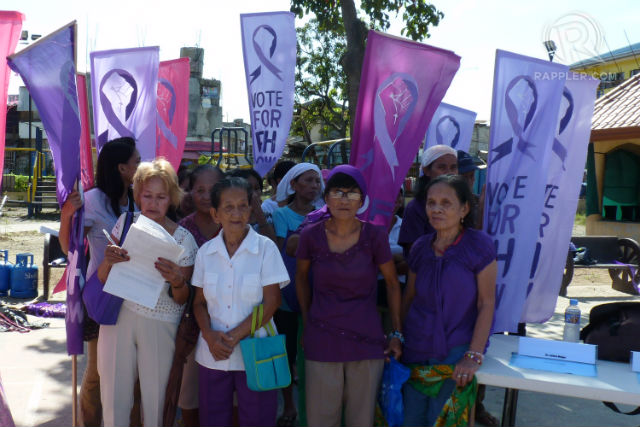SUMMARY
This is AI generated summarization, which may have errors. For context, always refer to the full article.
MANILA, Philippines – It was a fitting way to celebrate Women’s Day.
A group of more than 500 people from various sectors of government and NGOs gathered together, most of them dressed in purple, for a public consultation regarding the Implementing Rules and Regulations (IRR) of the Reproductive Health (RH) Law.
Republic Act 10354 was signed into law last December 21, 2012 and, as mandated by law, the concerned groups, led by the Department of Health (DOH) will have 90 days from the date of signing to draft the IRR.
Similar public consultations were held in Cebu and Davao.
Discriminating the youth
Questions were raised on various provisions of the IRR, but the provision about minors’ access sparked the longest discussion.
The section on the Access of Minors to Family Planning Services states:
No person shall be denied information and access to family planning (FP) services, whether natural or artificial.
A minor will only be allowed to access services to FP services in public health facilities if he/she
- Presents written consent from their parents and/or legal guardians; or
- Has had a previous pregnancy as proven by documentation that includes but is not limited to:
- Written document from a physician;
- Documentation through ancillary examinations such as ultrasound; or
- Written documentation submitted by a guardian
Anna Leah Sarabia, former executive director of KALAKASAN (Kababaihan Laban sa Karahasan) questioned this provision. “So, first, a girl-child must get pregnant–usually without her consent or against her will—and or have a miscarriage. Only after that will she get family planning services. What kind of law is that?”
It was also a point of concern for Alexis Sarza, founder of Batang Laging Umiiwas sa Tiyak na Impeksyon (BALUTI), an NGO that provides counseling and services to youth.
“Paano kami na grassroot level talaga ang mga tinutulongan na bata? May iba mga street children na wala naman magulang, ide-deny ba naming sila ng serbisyo?” asked Sarza. (What about us who work with grassroot communities? Some of these kids don’t have parents. Will we deny them service?)
“Parang lumalabas pa ng mas okay pa dati,” said Sarza. (The situation before seems better compared to this.)

Parental consent
The provision for parental consent was an amendment made by Senator Ralph Recto who insisted that not inserting it in the bill would mean giving contraceptives even to young people and encouraging them to have sex.
“We on the committee really really commiserate with you,” stressed Dr. Junice Melgar, executive director of the Likhaan Center for Women’s Health and a member of the IRR drafting committee. “But this is the law [that has been passed] and we have tried as much as possible to be liberal in it’s interpretation, but we also have to follow it.”
One advocate commented that the public consultation was futile because “it was like a copy-paste of the RH Law.”
Atty. Beth Pangalangan of Reproductive Health Rights, and Ethics Center for Studies and Training (REPROCEN) immediately addressed the observation by saying, “I’m sorry, but I cannot accept that comment. The RH Law itself is 24 pages, the IRR is 54 pages. We could not have simply copied and pasted its contents.”
As other comments and concerns were raised about restricting access to the youth and how this will hamper interventions to address the rise in teen pregnancy, members of the drafting committee admitted that compromises were inserted to get the law passed. But they said it would still serve its purpose to provide RH access and services to women.
“We all have to admit that this is not a perfect law. But we have to think about how long it took to pass this. We have to look at the good things about this law and how it can help us and protect our human rights,” said Pangalangan.
“Kung nasunod lang ‘yong mga anti, hindi ito magiging batas. ‘Wag muna natin hanapin ang kulang sa batas,” Pangalangan concluded. (If the anti got their way then we would not have this law. Let’s not focus on what the law lacks.)
The target date for the signing and publishing of the IRR is March 15. The IRR is set to take effect on March 31, 2013. – Rappler.com
Add a comment
How does this make you feel?

There are no comments yet. Add your comment to start the conversation.